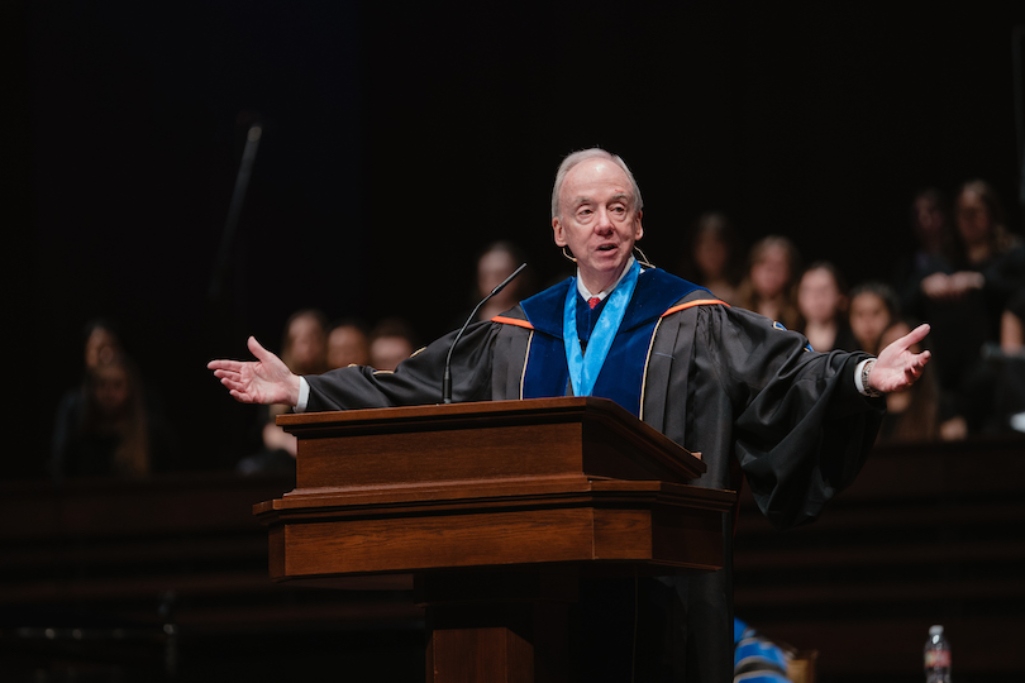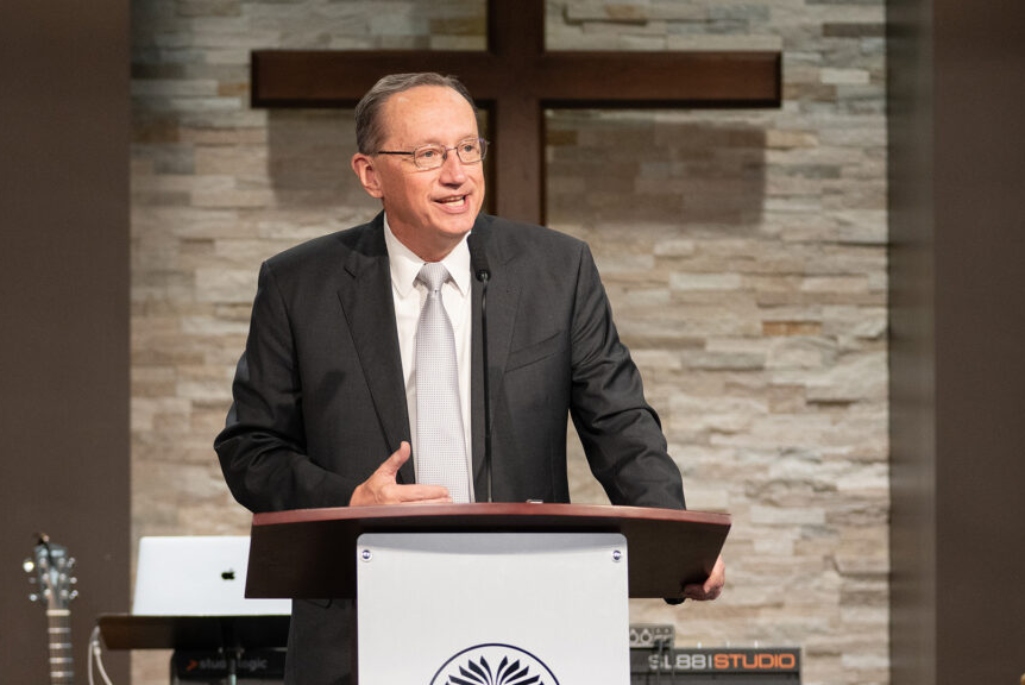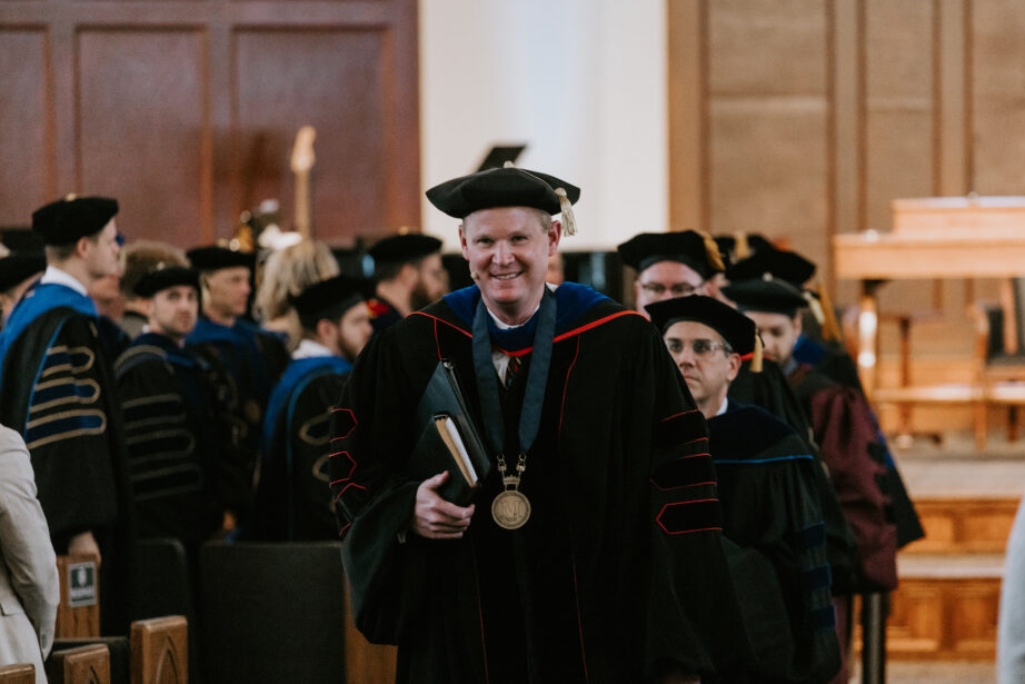
SWBTS President David S. Dockery.
Dockery outlines history of confessional statements at SWBTS convocation
By Ashley Allen, SWBTS
FORT WORTH, Texas (BP) – Explaining the history of confessional statements and how the core value of “confessionally guided” shapes the classroom and community of Southwestern Baptist Theological Seminary, President David S. Dockery encouraged students, faculty, and staff to understand the “hermeneutical lens” of the institution’s fourth core value during the Jan. 23 convocation service to begin the academic semester.
The service also included the installation of four administrators and the introduction of one new faculty member.
Before delivering his convocation address, Dockery noted the “wonderful spirit” across the campus as new student enrollment for the spring 2024 semester has increased “over 11 percent from last spring” and the “significant” increase in credit hours taught for the academic semester.
In a tradition that dates to Southwestern Seminary’s fifth president, Robert E. Naylor, Dockery, the institution’s 10th president, recognized new students as “Southwesterners” who join more than 40,000 other individuals trained on Seminary Hill who serve the world over as pastors, missionaries, church staff, and denominational employees, among others.
“I want to try to answer the question why we have a statement of faith, why it is important to us [and] what this statement means for our entire community – faculty, staff, and student together,” Dockery said. “We’ll do so because this core value runs the risk not so much of being misunderstood, but being underappreciated, often thought of as being only applied to those who teach in a certain subject matter or being relegated to the idea that it only means that Southwestern is merely a Baptist institution.”
Southwestern Seminary’s six core values – grace filled, Christ centered, scripturally grounded, confessionally guided, student focused and globally engaged – were introduced in January 2023 and approved by the institution’s board of trustees in April 2023 as part of the seminary’s “Advance Southwestern: 2030” institutional plan.
Acknowledging that Southwestern is “certainly a Baptist institution,” Dockery said he believes it is “important to note not only what this core value means, but what it also does not mean.” He harkened to the words of the late Leon McBeth, distinguished professor of church history, who observed the two noticeable ways Baptists have used confessional statements, notably “to proclaim Baptist distinctives” and “to show how similar Baptists are to other Christians.”
Dockery recalled that when Southwestern Seminary was founded in 1908, the first president and founder, B.H. Carroll, was “insistent” the institution adopt the 1833 New Hampshire Confession of Faith, a “widely-circulated, 19th-century Baptist statement.” Dockery said that Carroll and Calvin Goodspeed, a professor of theology of the school’s founding faculty, “went to great lengths” after the statement was adopted to give a series of lectures that would later be known as “A Commentary on the New Hampshire Statement of Faith.”
Carroll understood a shared confessional commitment assisted in three ways, Dockery said, including helping “the institution to declare publicly its beliefs,” serving as a “teaching tool” for both students and the larger community to understand doctrine, and encouraging a “sense of genuine unity” for the seminary family.
Dockery traced the history of confessional statements, beginning in the Old Testament to the New Testament, noting the words of Jude in his epistle – “the faith once for all entrusted to the saints.”
“This idea of the faith is a confessional faith that refers to a body of beliefs not so much our personal experience of faith but our shared community of faith commitments,” Dockery explained. The “true Christian faith” has been passed on in various forms, including The Apostle’s Creed, The Nicene Creed, The Chalcedonian Confession or The Athanasian Creed, he added.
Dockery noted that 17th-century early Baptists “gladly connected themselves to this wonderful confessional tradition in both General Baptist’s Orthodox Creed” and “the Particular Baptists in the Second London Confession.” He said Article 38 of The Orthodox Creed “specifically affirmed” The Apostle’s Creed, The Nicene Creed, and The Athanasian Creed, “declaring that all three ought to be thoroughly received and believed. For we believe that they may be proved by the most undoubted authority of Holy Scripture and are to be understood by all Christians.”
The need for confessions of faith “have often arisen” in order to “address and correct misguided ideas like Gnosticism, Docetism, Arianism, or other heretical movements,” that “made their way into the church and have continued to do so,” Dockery observed.
“Confessing our faith is something that each follower of Jesus Christ should do, but we do so not just in an individual way, we do so in community as we have done this morning,” Dockery said, noting the personal and communal elements of the confession of faith. “There is a beautiful aspect of the Christian tradition that invites people when they confess their faith to do so by loving one another so that with one mind we can confess our shared faith.”
As the fourth core value at Southwestern Seminary, Dockery said to be a confessionally guided institution “means that we joyfully accept our responsibility to pass on this faith not just to this community, not just to this generation, but to the next generation so the Gospel can be extended to the ends of the earth.”
Dockery said Southwestern Seminary’s core value scripturally grounded, the institution’s third core value, is affirmed before confessionally guided.
“We do so because our confession depends upon and is grounded in Holy Scripture,” Dockery explained. “Our confessional statement, then, serves as an interpretive guide, as a hermeneutical window, similar to the way the ‘Rule of Faith’ functioned in the second and third century, but this confession does not carry the same level of authority as Christian Scripture.”
He added that “affirming our confessional faith as a hermeneutical lens, through which to understand Holy Scripture, we are saying ‘yes’ to certain truths while saying ‘no’ to competing claims.”
Dockery said when Southern Baptists adopted the first Baptist Faith and Message in 1925, the same year that Southwestern Seminary was received by the Southern Baptist Convention, the statement of faith was influenced by the New Hampshire Confession in that it “affirming inspired Scripture as truth, without any mixture of error” while simultaneously rejecting “the public advocacy of evolutionary thought” that was becoming prevalent across Baptist college campuses.
The second president of Southwestern Seminary, L.R. Scarborough, led the “Southwestern faculty at the time to adopt and affirm the new 1925 statement,” Dockery said, adding both the SBC and Southwestern adopted revisions of the Baptist Faith and Message in 1963 and 2000.
Noting that confessional statements are “providentially directed,” but “have certain limitations since they are human summaries of divine truth,” Dockery encouraged the seminary community to “affirm the importance of the confessional tradition and Southwestern’s genuine and renewed commitment to be a confessionally guided community, while acknowledging that we do not affirm the same level of authority for the confession that we do for the Holy Scripture. He added that “unlike the Bible, which affirms its own inspiration and truthfulness, the confession makes no claims to infallibility.”
Acknowledging the confessional statement is both “essential and necessary as a safeguard” that helps the seminary keep “Christ-centered, evangelical, orthodox, and Baptist commitments,” but by itself it is “no guarantee of such faithfulness,” Dockery said, adding that “confessions are essential and necessary, but not sufficient.” He said the confessionally guided core value “must be understood in light of our commitments to the other five core values.”
“We do not wish for this important core value and its commitment to engender some type of unwanted, rationalistic, legalism – falling short of a full-orbed Christian commitment,” Dockery explained. “Instead, what we want from this community is a voluntary, warm-hearted, wholehearted commitment to carry forth the essence of the Christian faith as it has been articulated through the years doing so together alongside of our Baptist distinctives.”
He added, “Let us all say together this morning as Southwestern, as a confessionally-guided community, that such liberal revisionism will not take place in this community on our watch.”
Dockery said the confessionally guided core value is “important” for five reasons. He said the value assists in the connection with the “Christian confessional tradition” and understanding the affirmation of the communion of saints; gives a “hermeneutical window” to Southwestern’s “scripturally-grounded commitments;” clarifies Baptist distinctives; helps balance the “mandates of right belief, right Christian thinking, and right Christian living;” and, lastly, supports correct thinking about how to bring the “Christian faith to bear upon our teaching, our learning, our in all aspects of our work across this community” especially as “we relate to one another in love.”
Dockery noted Southwestern is entering the 100th year of its official affiliation with the Southern Baptist Convention, having been received during the 1925 annual meeting, which also adopted the first Baptist Faith and Message statement and what became known as the Cooperative Program.
“Reflecting on these far-reaching decisions of the 1925 Convention remind those of us who serve here at Southwestern that our confessionally guided commitments are also connected to our commitments to the Southern Baptist Convention and to the spirit of cooperation,” he said.
Recognizing the various generational and cultural backgrounds of the Southwestern community, Dockery concluded, “One of the things that will evidence the depth and authenticity of our confessional commitments, as well as our attention that we can give toward one another is the way we live out the implications of this confession, each and every day, through our genuine love and respect for one another and the ways in which we serve together in harmony and heartfelt collaboration.”
Prior to Dockery’s convocation address, one new faculty member was welcomed, one faculty member was installed into an academic chair, and three administrators were installed into administrative roles.
Madison Grace II, provost and vice president for academic administration and dean of the School of Theology, introduced Kevin Rogers, associate professor of intercultural studies at Texas Baptist College, the seminary’s undergraduate school. Rogers, who serves with the International Mission Board (IMB), will be on campus in the fall.
Dockery led in the installations of one academic chair and three vice presidents.
Dean Sieberhagen, interim dean of the Roy J. Fish School of Evangelism and Missions, was installed in the Charles F. Stanley Chair for the Advancement of Global Christianity. Sieberhagen joined the Southwestern faculty in 2013 following more than a decade of service with the IMB.
Travis Trawick was installed as the vice president for institutional effectiveness and strategy. Trawick has served in various capacities at Southwestern since 2007 and has taught as assistant professor of theology in the School of Theology since 2021.
Adam Dodd, assistant professor of Old Testament and biblical backgrounds, was installed as vice president for campus technology. A three-time graduate of the Fort Worth institution, Dodd has served on Seminary Hill since 2010.
Chandler Snyder, who began serving at Southwestern in June 2022, was installed as vice president for enrollment and student services and dean of students. Snyder, who previously served with the IMB, is instructor of missions in the Fish School and is completing his Doctor of Philosophy degree at Southwestern.
Dockery’s entire message can be viewed here.

Iorg: Sustain a lifelong passion for ministry
By Tyler Sanders
ONTARIO, Calif. (BP) – Gateway Seminary President Jeff Iorg called back to his first convocation message, delivered in August 2004, by encouraging students to maintain a passion for ministry during the school’s opening chapel services this spring semester.
He began his 40th convocation sermon with a line from the introduction of his original message.
“My goal for you is that you leave this place with a lifelong passion to accelerate the fulfillment of the Great Commission,” he said, “and a willingness to sacrifice yourself, no matter what that may mean, to see the Great Commission of the Lord Jesus Christ accelerated in our generation.”
Iorg asked attendees to read Matthew 9:35-38 with him.
Jesus continued going around to all the towns and villages, teaching in their synagogues, preaching the good news of the kingdom, and healing every disease and every sickness.When he saw the crowds, he felt compassion for them, because they were distressed and dejected, like sheep without a shepherd. Then he said to his disciples, “The harvest is abundant, but the workers are few. Therefore, pray to the Lord of the harvest to send out workers into his harvest” (CSB).
“It is noteworthy,” he said, “the word ‘passion’ is not found in our text, but a similar word, ‘compassion’ is used to describe how Jesus felt about the people He encountered and the resulting missional directive He uttered.”
Iorg explained the word “compassion” comes from a noun that refers to intestines and that the verb form means “agitation in the bowels.”
“It should be understood metaphorically; referencing deep-seated, inner emotions,” he said.
“When the word is used in the Bible, it is usually connected to some concrete action – like feeding the 4,000, granting extravagant forgiveness, or healing blind men.”
He warned against a potential misunderstanding of compassion as “sympathy, empathy or kindness,” but to hold on to this part of the word: “passion.”
“Jesus passionately met the needs of people and fulfilled His missional imperative. We need the same motivation to sustain us over a lifetime of pursuing God’s mission,” he said.
Iorg summarized the context of the passage in the preceding verses of Matthew 9: Jesus’ healing a paralytic man, a hemorrhagic woman, two blind men, reviving a young woman from death, casting a demon out of a man and provoking Pharisees.
“Jesus was vigorously engaged with hurting people in contrast to religious elites who were preoccupied with distancing themselves from the unclean masses,” he said.
“Passion is fueled by engagement with people who need Jesus. Often the opposite is taught today.”
Iorg contrasted the common ministry warnings against burnout with the invigoration Gospel ministry can provide. He pointed to Jesus’ example which demonstrates the refreshing outcome of investing in people and reaching the lost.
“When we are engaged in reaching hurting people, we experience a spiritual transaction Jesus described this way [in Matthew 16:25]: ‘For whoever wants to save his life will lose it, but whoever loses his life because of me will find it,’” Iorg said.
“There is something life-giving about selfless, self-emptying service which meets the needs of hurting people, shares the Gospel with them, and advances God’s mission at the grassroots level.”
In his concluding remarks, Iorg warned current students to protect their passion for ministry while they study; to be careful to avoid becoming “Gospel-analysts” instead of “Gospel-communicators.”
He concluded the convocation message by reiterating and revising his statement from his first convocation in 2004: “My goal is you will leave Gateway imbued with a lifelong passion for ministry leadership and a willingness to sacrifice yourself, no matter what that may mean, to accelerate the fulfillment of the Great Commission of our Lord Jesus Christ in your generation.
“May God make it so for our good and his glory.”The message was one of Iorg’s last convocation addresses as Gateway president. He announced his upcoming retirement last October.

Allen addresses priority of prayer at spring convocation
By Brett Fredenberg, MBTS
KANSAS CITY, Mo. (BP) – In the spring convocation service at Midwestern Baptist Theological Seminary on Jan. 23, President Jason Allen announced the installation of two faculty members to endowed chairs and preached a sermon titled, “Too Busy Not to Pray.”
Beginning the service, Allen reflected on the importance of convocation, saying, “At the beginning of each semester, we come together to set ourselves apart and renew our commitment to the task of training men and women for the cause of Christ and for the Church.”
He continued, “The formality of our service today represents the seriousness of our work. In this place we are not playing with trivial things nor dabbling in mundane things. We are engaged in life and death work, eternal work, in training men and women in the Word of God to be equipped and ready for wherever God may call them to serve.
“Today we look forward to all the promise of a semester ahead, to what we are trusting the Lord to do, and to what we are aiming to accomplish in this institution for God’s glory around the world.”
Too busy not to pray
In his sermon, from Mark 1:29-31, Allen emphasized the prayer Jesus prioritized and the preaching Jesus pursued.
“We live in an age of busyness and distracted priorities,” Allen said. “‘Too busy not to pray’ is an inverse logic, but it is a true and necessary logic at the same time. Excuses will always abound in communing with God in prayer but let us not allow ministry to keep us from Jesus. Let us not forget the barrenness of busyness.”
Following his emphasis on prayer, Allen also spoke to the preaching Jesus pursued.
“Healing, however spectacular and sweet it may be, is not the mission for which Jesus came. He came to preach a message of forgiveness. His work was to preach the Gospel. Ultimately, Jesus’ work is a heart work. Our main pursuit, as His disciples, is to be a heart work as well.”
He concluded his message with an encouragement to attendees, “To carry out that work as we ought, we must have our hearts being continually worked on. That takes place, first and foremost, through the Word of God and through coming to the Lord in prayer.”
Faculty installations
After concluding his message, Allen announced the recent installment of two faculty members into endowed chairs at the seminary. Both chairs were established in partnership with the Missouri Baptist Convention.
“To be a faculty member of this institution is a very special seat one takes, and we’re grateful for each and every faculty member at the seminary and college,” Allen said. “In this season of ministry, we have strategically prioritized the formation of endowed chairs, providing for all or a significant part of an academic professorship. We’re delighted to be able to install both of these faculty members into two significant chairs in our institution.”
The Gary Taylor Endowed Chair of Missions and Evangelism will be occupied by Assistant Professor of Missions Joe M. Allen III.
Allen III earned a Ph.D. in Applied Theology from Southeastern Baptist Theological Seminary and a Th.M. in World Missions and Historical Theology from Dallas Theological Seminary. From 2007-2021, he and his family served with the International Mission Board in South Asia in Muslim and Hindu contexts.
The John and Sharon Yeats Endowed Chair of Baptist Studies will be occupied by Research Professor of Church History Thomas S. Kidd.
Kidd completed his Ph.D. in History at the University of Notre Dame, where he worked with historian of religion George Marsden. He is the author of numerous books, written for various media outlets including The Washington Post, and blogs regularly.
Allen said of both men: “In the world of higher education, being installed in an endowed chair is amongst the highest honors an institution can bestow on a faculty member. May your service in this endowed chair be used to the glory of God by enabling Midwestern Seminary to better fulfill its mission for the Church.”
Spring chapel speakers
Additionally, the convocation service marked the beginning of spring chapel services. The speakers featured this spring include ministry leaders, scholars, and pastors from around the world, in addition to the members of the seminary and college faculty.
The featured speakers will include:
- Tony Reinke (author and senior teacher, Desiring God)
- Noah Oldham (senior director of culture & care, Send Network)
- Matt Carter (vice president of mobilization, Send Network)
- Don Carson (emeritus professor of New Testament, Trinity Evangelical Divinity School)
- Mark Dance (director of pastoral wellness, Guidestone Financial Resources)
- General Douglas Carver (executive director of chaplaincy, North American Mission Board)
- Chris Williams (president, Missouri Baptist Convention; pastor, Fellowship Church)
- Paul Chitwood (president, International Mission Board)
- Michael Reeves (president and professor of theology, Union School of Theology)
The list of Midwestern Seminary and Spurgeon College faculty speakers includes Jason Duesing, Sam Bierig, Thor Madsen, Patrick Schreiner, Jeff Dodge, Ben Awbrey, and Michael McMullen.
Chapel services are held in Midwestern Seminary’s Daniel Lee Chapel on Tuesday and Wednesday mornings at 10:00 a.m. Services are also live-streamed on the seminary’s Facebook page and the seminary’s website at www.mbts.edu/live.
To view the full chapel schedule, visit www.mbts.edu/chapel


